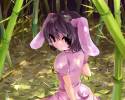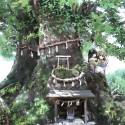Nazrin was in a fouler mood than she had dwelt in for many centuries.
Not even the yearly mass-burglaries of the hermit Seiga had galled her half as close.
Those were indiscriminate, and generally she did not lose anything of great worth, since the Hell-bound
shikaisen had all the inborn treasure-sense of a rheumy old furrowing-ox.
But today she had been
targeted. In spite of her countersurveillance against the
tanuki, and the constant perambulations of that nosey magician; in spite of her condition of mutual honour with the rabbit Inaba, founded upon that ancient chain of gratitude between them which ran through Daikokuten; in spite of her consistent care to move always under cover from the naked sky, and dissemble always the real objective of her actions—she had been waylaid by a
daitengu at the very last possible moment, and the result of the last
month of effort had been snatched away.
And what was she to have done about it? Shot every rook and raven out of the sky on sight?
She had half a mind to begin doing so out of general principle.
As she stumped her mud-crusted way home to Muenzuka, the evening rain did not come, only thundered impotently in the distance, and Nazrin found herself gathering up handfuls of parched grasses from the roadside, with the imagined intent of laying fell curses through effigy in the pagan
jindō manner. She could not bear to think of Bishamonten right now … nor of Jizō, when she remembered how uneasy Narumi had become by the end of her visit, and how readily the magician had put her out on her feet. Likewise desired she not to think of any others in whom she yet bore faith.
Only the confines of her square hut could hold any comfort for her now. And a hut it may have been—but a
comfortable one. She had raised it up herself, planed its every timber by hand and been exacting in their fit, and its gable roof never once permitted a leak, whether of rain or snow or pale moonbeam. The chests and cabinetry were likewise level and varnished, and there was a neat place for everything to belong which she saw fit to keep and own at length. Every moment of its construction, and every moment afterwards spent within, was a treasured memory to the little mouse.
When she arrived therefore to its door despoiled and hanging open, and her mice giving out desperate alarm calls at the perimeter, Nazrin was invested with a wrath that could have smothered even the dread grudge of Sutoku, like a yawning ocean-swell over a mere campaign-fire.
But the one within was a
tengu more great than even he.
(
https://www.youtube.com/watch?v=cMVpIxHN3Mc ; if you please. That is to say: Track 06,
Neo-traditionalism of Japan.)
The little mouse marched in blindly dauntless, till she stood in the middle of the hut—
her hut, with its joisted floor and soft rush mats over closely-mated hardwood, and where she had dreamt many a dream of brilliant treasures beyond compare. Whereupon, in spite of her prior readiness to stake her very life for it, here and now, she looked up, and dared abruptly not to go even one step further; and her very feet refused to shift from their rooted place.
But still was it a closer approach to
her by far, than had achieved any other in the remembered past.
The Gongen of the Highest Peak leaned forward atop the cabinet, exposing her alabaster wrists atop crossed knees and calves out of the gathering black.
And spoke quietly to the mouse, as the Lord Tenma.
“It is custom,” she began, in a voice which belied any notion of age, at once fair and young and wise and severe, and above all numinous, terrible and sublime: “
ancient custom amongst we
tengu, when we have become indebted by any mean, to provide seven miraculous blessings in return … Therefore, before any explication may be had, allow this to be the first, as the token and troth of my goodwill.”
The
tengu sovereign raised up a slim finger, which grew crookedly long before the mouse’s eyes, and tipped itself with a raptorially hooked black talon.
“The Child of Miare in her Chronicle writes that when you set out in search of any item, you must possess a clear conception in your mind of that which it is you seek. Has the child writ truly in this regard?”
At length, Nazrin was able to produce a smallest nod.
Tenma withdrew the talon, and swirled her hand—once more restored to beauty—in front of her, and conjured, by some long-accustomed sleight of hand, an orb of crystal atop her palm, much resembling the red scrying-pearl of the
daitengu. But where that had been a grave, striated red of mortification, this newest orb iridesced brightly in the lowering dusk, suffusing the four walls of the hut with a marvellous spectral dance of all colours, and shining as if it held captive within itself the very prismatic light of water-spray. Only its master was not illuminated in any way by the shimmering light, save the immaculate hand which held it out.
“This,” she explained, “is an Izanagi Object. Or, rather, it is an artefact from the age of the primordial gods; and though it is not exactly right to call them collectively by any name, we must for brevity’s sake refer to such things as Izanagi Objects … In general such Objects have no fixed forms; nor names nor ownership. They are relicts of the former world which once was—and
was is perhaps the only word for it. They are of the world which
nothing more than was, prior to any finite meaning or signification. That indefinition is the wellspring of their illimited divine power, and it grants them a primogenitural claim towards the title of being the only things in this world which may be considered truly Real … Indeed, it is the raw stuff of divinity.
“Of course, such a description is rather abstract. But there is a great concentration of Izanagi Objects beneath our own Mountain, harboured within the stony breast of our Lady Iwanaga; and others lie scattered all throughout this Eastern Country, so full of untold wonders and stories is she. Many of them have been refined, and fashioned into tools, given over to names and ownership at last—at once limiting their potential, but rendering them therefore manipulable, usable, ready-to-hand. A great many will be found in the shape of
magatama, having metamorphosed sympathetically in the wake of the upstirring of the land by his Augustitude Izanagi and her Augustitude Izanami. But the very spear which was used to accomplish this, the Jewelled Spear of Heaven, had itself also been an Izanagi Object, and the bicoloured Orbs of the Hakurei as well.
“And so too was the pearl of the
daitengu which you had unearthed; and also this, mine own pearl. My Palantír,” she said, pausing shortly to chuckle at some private joke entailed there. Then, just as readily, she recomposed herself: “… Now I believe I must apologise. I must reveal that the pearl you found had been a fabrication; albeit it was fashioned out of a legitimate Object. But I was the one who shaped it, and manufactured the false record of the meteor fall, and had the stone Tian-gou buried there. Then, and here I must express my sincerest contrition, I cajoled the child Yatadera to convince you of its provenance—though by no falsehoods, from either myself or from her!—and I ensured that the same information arrived to the ear of Hajun as well.
“But rest assured that if real harm were to have befallen you at that juncture …”
Tenma only inhaled deliberately; but the mouse was reminded all the same of the lethal talon which had been presented.
“… Well, it would not have. I shall swear to you as much.
“In any case, it had been my intention from the outset for that pearl to fall into his hand. It would have been worthless anywhere else—for its every sound and image is decided by myself, through this, the genuine
daitengu pearl. And Hajun himself will not be able to retain it, in the end … I will not go deeper into the circumstances. Doubtless you understand the utility in such a thing. But to accomplish it I had to convince him of its being genuine; and to that end I concocted this little adventure for you. Indeed, you were the only one who could have performed it to my satisfaction. None of my own subordinates could have been so thorough and circumspect.
“You have met with every one of my expectations,” concluded Tenma, a genuine warmth radiating from within the words, “and done me a great favour, even if you had not been aware of it in the doing … And now, I must only pray that my own recompense meets every expectation of your own. You shall discover the rest of my gifts easily, I think, over the coming days and months—though I must deny that any Object will be amongst their number. That would be a luxury beyond even my own unsmall means.
“And besides,” said Tenma, now lightly and free, and she vanished the glowing pearl, startling Nazrin out of her erstwhile reverie—“I don’t believe you would want such a thing from me anyhow.”
In the Object’s sudden absence, the hut was plunged into the fulness of night, and a chill draft blew through the open door. Nazrin spun towards it at once, having felt a briefest brush of silver hair passing backward over her cheek, and the touch of something warmer as well.
“
After all,” said Tenma, from already a great many miles afar, her words borne back by an obeisant wind to the ears of the much-beloved little mouse, “
… it would spoil all the magnificent fun of searching!”
* * *












